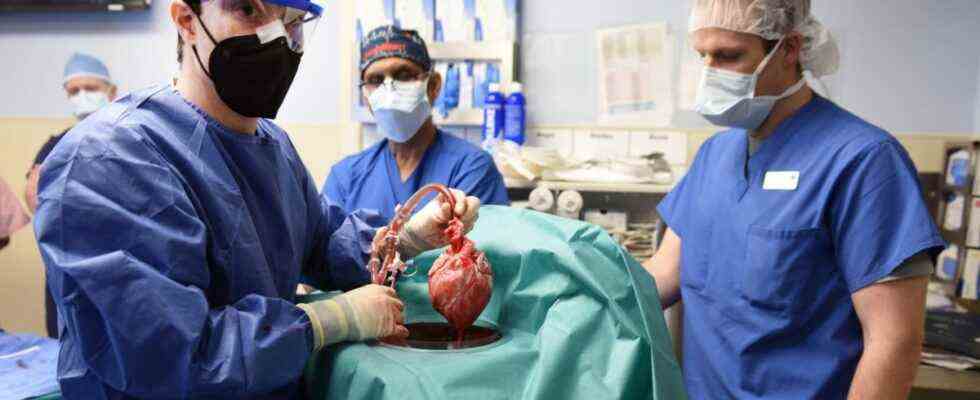On January 7th, the heart of a pig was transplanted into a man in the United States for the first time. So far, things are looking good for him – according to the University of Maryland on Sunday morning, 57-year-old David Bennett is doing well a month after the sensational surgery, given the circumstances. But the surgery is new scientific territory. There is a risk that the situation will deteriorate.
“The long survival time of one month is a huge success for xenotransplantation, especially when you consider that the first human-to-human heart transplantation in Germany lasted less than 24 hours,” explains Joachim Denner, transplantation expert from Freie Universität Berlin. According to the University of Maryland Medical Center in Baltimore, where the operation took place in early January, there has been no sign of rejection from Bennett so far. He was awake, responsive and asked medical staff when he could go home.
However, this is not likely to happen any time soon, as Bennett has to be monitored around the clock in the clinic. The greatest danger is that the body will reject it, says Denner. “The immune system needs a certain amount of time before it builds up an immune response. At the moment, the antibodies and immune cells that would be able to reject the organ are only being formed.” The medical masterstroke of the scientists in the USA was to bypass or otherwise overturn the various mechanisms of the human body that could lead to rejection from the outset. In order for their organs to be used for humans, the genome of the donor animals must be modified.
In the case from the USA, ten genetic modifications were made. Among other things, this involves certain sugar structures on the surface of pig cells, against which humans naturally have antibodies. There is also the risk of blood clots. The patient is also given medication to suppress the immune response.
Transplants like this could be an opportunity for the seriously ill who are waiting for a replacement organ
The pig for the transplant in Baltimore was bred by a US company. The stalls, which are strictly sealed off and monitored, now house only a few pigs. However, if further progress is made, demand could increase sharply in the years and decades to come. Finally, other organs such as kidneys and islet cells that produce insulin could also be used for transplantation.
What sounds futuristic and possibly repels many people could one day be an opportunity for many seriously ill people who are waiting for a replacement organ. Then patients could also get a replacement heart “who are way down the waiting list and would never have a chance of getting a human organ,” says Denner. And the pig heart also has a great advantage, because it has been virologically tested – and among other things guaranteed free of HIV, the rabies virus and other pathogens. “As technology advances, it might be even better to get a pig heart than a human heart,” explains Denner. The basis for operations similar to those in the USA has also been created in Germany. However, it is still unclear when the first transplant could take place.
There is also no telling how long David Bennett will live. However, one should not expect that the seriously ill American will ever be able to experience normal everyday life again. According to his doctors, he is currently doing physical therapy to at least get back on his feet. But walking is not to be thought of yet. But surely this would be another milestone, if not a small miracle.

